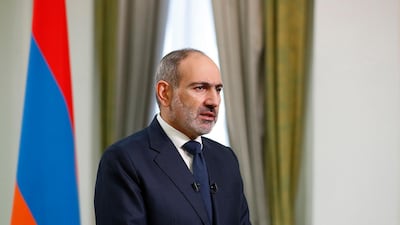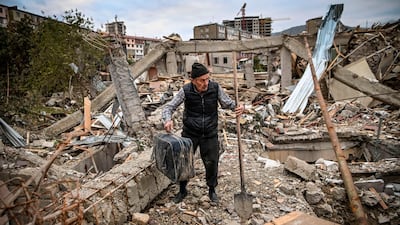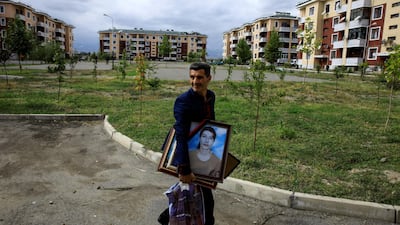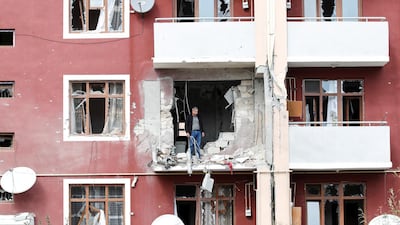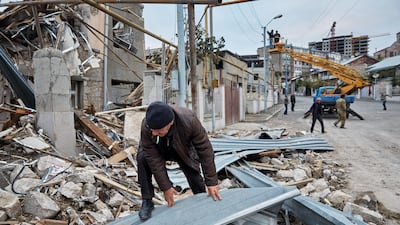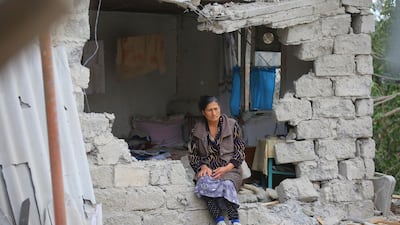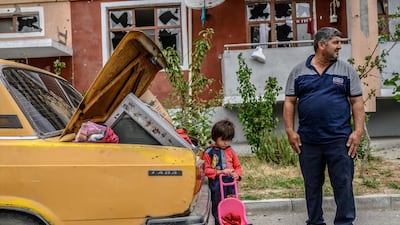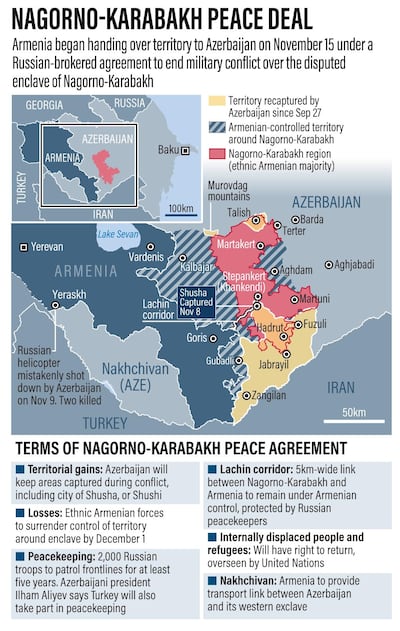Days of unrest after Armenia’s ceasefire deal with Azerbaijan to end the fighting in Nagorno-Karabakh culminated in an apparent coup attempt against Armenian Prime Minister Nikol Pashinyan.
On Saturday, Armenia's National Security Service announced it prevented an assassination attempt on Mr Pashinyan by former officials. Those officials sought to then seize power in the country, the NSS said.
Former NSS head Artur Vanetsyan, former head of the Republican Party parliamentary faction Vahram Baghdasaryan and volunteer brigade commander Ashot Minasyan were arrested.
"The suspects were planning to illegally usurp power by murdering the prime minister and there were already potential candidates being discussed to replace him," the NSS said.
Armenia's capital, Yerevan, has been gripped by protests against the ceasefire since Mr Pashinyan announced at 2am local time on Tuesday that he had signed a deal with Azerbaijani President Ilham Aliyev to end the 44-day war over the disputed territory of Nagorno-Karabakh.
The deal enshrined Azerbaijani control over areas of Karabakh it had captured during a month and a half of fighting, as well as handing over additional areas around the rump of Armenian-controlled Karabakh, where Russian peacekeepers are now present.
Shortly after the deal was signed, protesters broke into parliament and the prime minister's residence, chanting slogans including "Nikol betrayed us"
On Wednesday, opposition parties organised a rally attended by thousands in Yerevan's Freedom Square where they called on Mr Pashinyan to resign.
The protests combine popular anger with an attempt by the previous ruling Republican Party to return to power.
On Monday, hours before news of the ceasefire deal broke, 17 opposition parties, including the Republic Party, called for Mr Pashinyan’s resignation.
While pressure on Mr Pashinyan and his ruling My Step coalition remains high, it is unlikely he will be toppled in the short term, analysts said.
"The general political atmosphere for the government is bad and it's not going to improve any time soon," Hrant Mikaelian, a political analyst in Yerevan told The National. "There is pure anger in the streets, after the [territorial and human] losses."
Despite this, he said the apparent coup attempt did not appear to pose a major threat to the authorities.
“I think there was no real attempt [to topple Pashinyan]. The military is going to try to stay neutral in this fight,” he said.
There have been rumours that officers sympathetic to the old regime could attempt a coup.
While anger against the prime minister and his government is high, the lack of viable alternatives has left many people feeling resigned to his leadership.
“Nikol [Pashinyan] needs to leave,” said Ashot, 44, a mechanic who lives in Yerevan's Nor Nork suburb.
“But I don’t know what would come next. We can’t go back to Rob [Kocharyan, president from 1998 to 2008] or Serzh [Sargsyan, president from 2008 to 2018]. They robbed the country and left us where we are now."
Others echoed his sentiments.
“My life personally got better in the last two years,” said Aram Vardanyan, 32, who lives in the Armenian city of Etchmiadzin, speaking of Mr Pashinyan’s time in power.
“I think Pashinyan should resign only if the old government will not return to power. Right now, we need to focus on some way to save Artsakh [the Armenian name for Nagorno-Karabakh] through the negotiations."
Mr Pashinyan, 45, came to power on the back of 2018's so-called Velvet Revolution. He replaced Mr Sargsyan, the head of the Republican Party who ruled Armenia for 10 years.
